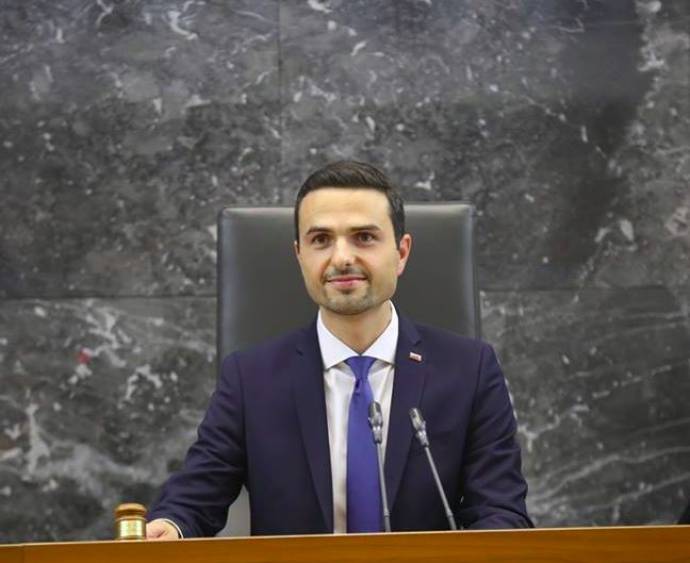Tonin, picked as an interim solution by the five centre-left parties after they failed to agree on a single candidate, received the backing of all deputy factions bar the nine MPs of the Left. With one vote invalid, he won an overwhelming 80 votes in the 90-member National Assembly.
Tonin said that he understood his appointment as the first step toward a stabilisation of the political arena, a move that sent out a positive message to the public that Slovenian politicians were capable of reaching a consensus and finding solutions. "And a solution too that surpasses the classic bloc divide."
While some see his appointment as a first step toward a new coalition, Tonin said that his appointment was meant to prevent parliament ending up without a speaker. He also said that his election would not be an obstacle to a future coalition. Once the coalition is clear he was willing to withdraw from the post.
The new speaker pledged to do everything in his power for a swift completion of procedures needed to get the legislature in motion and appoint its working bodies, in particular the Foreign Policy Committee, which is needed to discuss a lawsuit against Croatia over the border arbitration impasse.
He also called for forming a development-oriented government as soon as possible. "As speaker I will do everything in my power so that we get such a government soon ... Our commitment must be that we'll work for the benefit of our people and homeland."
Referring to topical issues in Slovenia and internationally, Tonin said: "If we want to overcome the challenges successfully Slovenia must learn to breath with both lungs, left and right." He concluded his address with "God live Slovenia".
Tonin's bid was submitted by 50 MPs of the Marjan Šarec List (LMŠ), Modern Centre Party (SMC), Social Democrats (SD), Pensioners' Party (DeSUS), Alenka Bratušek Party (SAB) and the NSi with Šarec as the lead sponsor.
Šarec, whose party is the second largest faction in the new parliament after the Democratic Party (SDS), said that "these are the contours of the coalition we want". However, Tonin announced that the NSi would continue to talk to both sides, adding that it had so far substantive talks only with the SDS.
Miro Cerar, the outgoing PM and SMC leader, who had been one of the potential candidates for the speaker, described selection of Tonin as a step "towards forming a stable centrist coalition", a view echoed by the other centre-left parties.
Tonin was also backed by the election winner, the right-wing SDS, and the far-right National Party (SNS). The only faction voting against was the Left, whose inclusion into a centre-left coalition would be an alternative to the NSi's.
SDS leader Janez Janša said that his party did not see any reason not to back Tonin. He said that Slovenia was facing serious problems, which, although often unnoticed, were piling up. "Establishing the National Assembly is a pre-condition so that these problems start getting solved."
Responding to a tweet by former Justice Minister Aleš Zalar suggesting the centre-left bloc was in fact helping form a Janša government in a repeat of the situation in 2011, Janša tweeted: "Not yet. For now we are only solving the deadlock of the so-called left, which is only able to agree on somebody who is not theirs."
Analyst Alem Maksuti sees Tonin as a logical choice, being that he is compatible with both political blocs, which like him stand for neo-liberal politics. However, he does not think his appointment is a sign of a future coalition yet.
The 12th speaker of the National Assembly, Tonin will only turn 35 at the end of July, but he is not the youngest speaker; Jožef Školč was elected to the post in 1994 a month after turning 34.
Slovenia's eight National Assembly has 22 women, ten fewer than so far. Thirty-six of the deputies served in the previous term and four have so far served as mayors.
After the inaugural session, MPs need to form deputy factions within seven days and name full-fledged heads. Within 30 days they also need to appoint deputy speakers, chairs of working bodies and the new secretary general.
President Borut Pahor needs to nominate a prime minister-designate within 30 days, once he has consulted heads of new deputy factions. In his address to parliament today he said that he planned to start the consultations this or early next month.
Pahor repeated that he would offer the first chance to form a government to Janša. In that case he would formally nominate him as PM-designate in early July. If someone else has the necessary majority, Janša would not accept the mandate.
Pahor appealed for good cooperation with the house, and told MPs that Slovenia' security and well-being would depend "on our capability and readiness to cooperate".
"We have been elected by different people, and we have different views among ourselves, but we also have the obligation to respect these differences and harmonise them," the president added.






